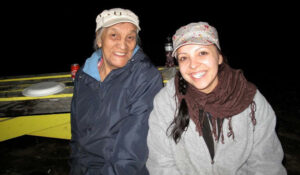Joanne Reeves-Rood will be pulling double duty on National Indigenous Peoples Day when she travels across the country to attend Yorkville University’s graduation ceremony.
Not only will the 35-year-old full-time mom from Cochrane, Alberta act as valedictorian of her Master of Education in Educational Leadership class in Fredericton on June 21, but she’ll also take the opportunity to share a special prayer song with her fellow alumni and their guests at the post-graduation party.
Performed by Reeves-Rood’s grandfather Julian Ribbonleg – an elder of the Little Red River Cree Nation’s Fox Lake Reserve in northern Alberta – Reeves-Rood said she hopes the song-listening exercise will help unite all in a reflection upon Canada’s First Nations history.
“My grandfather has given me permission to share his music, The Ancestor Song, which is his healing song for the nation. He was one of the lucky ones who didn’t attend residential school, and because of that, he’s one of the only elders in the community who’s still very much in touch with his culture,” she said.
“I feel it’s important to acknowledge traditional Indigenous history, knowledge and culture and to share that culture, because that’s how we’ll gain an understanding of one another.”
Of her own upbringing, Reeves-Rood said being raised between her parents’ two cultures – at Fox Lake with her First Nations mother and in a rural area outside Calgary with her Caucasian father – helped reveal to her some of the disparities between the two.
And that, she said, is what inspired her to become an Alberta Permanent Certified Teacher, specializing in Indigenous education, early literacy, and child psychology.
“I wanted to find a way to improve Indigenous academics, because as an Indigenous student growing up myself, I saw the differences between the public schools and the band-run schools, because I went to both,” said Reeves-Rood, who also spent five years as a teacher in First Nations schools before deciding to pursue her Masters of Education at Yorkville.
“Having worked in schools on reserves, I know students are generally assessed two grades lower, so I wanted to get to the bottom of how we can improve First Nations education and help to create opportunities for Indigenous students.
“Throughout my experience of both attending and working within First Nation schools, I saw a lot of injustices that encouraged me to pursue higher education – so that’s why I started my degree at Yorkville.”
What Reeves-Rood did not anticipate upon entering into those post-graduate studies, however, was the life-altering metamorphosis the experience would bring about in her.
“I didn’t realize the transformation I would go through, and I think that’s because I didn’t know my own ancestral history. Residential schools weren’t something that my family talked about,” she said.

Reeves-Rood’s late maternal grandmother, Mary-Louise Ribbonleg, was a silent survivor of the government-sponsored religious school system, which was established to assimilate Indigenous children into Euro-Canadian culture.
“She never discussed it – ever. It wasn’t until I had to read a lot of reports from the Truth and Reconciliation Commission during my studies at Yorkville that my eyes were opened up to what actually happened and the deep dark history behind it,” said Reeves-Rood, who was pregnant with her now-nearly two-year-old son Emerson at the time.
“I went through an awakening journey. I didn’t know I needed a deep healing, but it was almost like I had an ‘aha moment’ and things became clear.”
The birth of her son, Reeves-Rood added, also helped her focus her studies with a rejuvenated sense of purpose.
“Through my research, I came to the conclusion that it’s not only Indigenous people that need reconciling, it’s everybody – it’s the whole nation of Canada, it’s the whole world, it’s all of Mother Earth’s beings,” she said.
“Part of my healing journey included accepting the truth and having empathy for the survivors, and dealing with those feelings that I didn’t want to feel.”
Reeves-Rood also discovered yoga during her studies at Yorkville – something she said helped her slow down and focus.
“Yoga and meditation were a really big part of my time during school,” she said. “Having to be so busy and juggle everything, I needed that time to slow down and focus, so I learned how to meditate and do yoga, and I also started exploring all these energy healing modalities, like reiki and acupuncture, crystal therapy and aromatherapy.”
Now that she’s fully graduated, Reeves-Rood said she plans to write a book all about her healing journey, while simultaneously working towards her PhD through an online university based out of the U.S. Her ultimate goal is to teach at the post-secondary level one day.
To those ends, both Reeves-Rood’s book and post-graduate doctoral research, she said, will be based on bringing her Indigenous views to the Western world.
“My hope is to showcase how Indigenous views connect to yoga and meditation, and how this can bring about an intrinsic self-healing that we all have access to,” she said, quoting the Dalai Lama’s belief that the world could be eliminated of violence within a single generation if only every eight-year-old on the planet were taught to meditate.
“There’s a beauty to Indigenous views and knowledge systems, and the beauty is that we’re all connected and that we need to realize this so we can work together in order to live a harmonious life – not only for ourselves but for humanity.”






